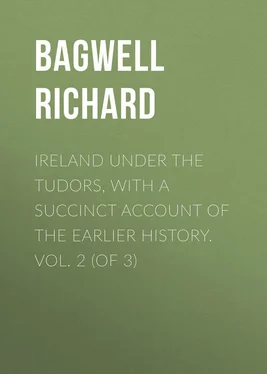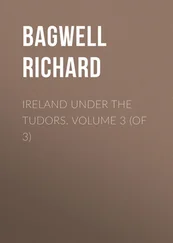Richard Bagwell - Ireland under the Tudors, with a Succinct Account of the Earlier History. Vol. 2 (of 3)
Здесь есть возможность читать онлайн «Richard Bagwell - Ireland under the Tudors, with a Succinct Account of the Earlier History. Vol. 2 (of 3)» — ознакомительный отрывок электронной книги совершенно бесплатно, а после прочтения отрывка купить полную версию. В некоторых случаях можно слушать аудио, скачать через торрент в формате fb2 и присутствует краткое содержание. Жанр: foreign_antique, foreign_prose, Историческая проза, на английском языке. Описание произведения, (предисловие) а так же отзывы посетителей доступны на портале библиотеки ЛибКат.
- Название:Ireland under the Tudors, with a Succinct Account of the Earlier History. Vol. 2 (of 3)
- Автор:
- Жанр:
- Год:неизвестен
- ISBN:нет данных
- Рейтинг книги:4 / 5. Голосов: 1
-
Избранное:Добавить в избранное
- Отзывы:
-
Ваша оценка:
- 80
- 1
- 2
- 3
- 4
- 5
Ireland under the Tudors, with a Succinct Account of the Earlier History. Vol. 2 (of 3): краткое содержание, описание и аннотация
Предлагаем к чтению аннотацию, описание, краткое содержание или предисловие (зависит от того, что написал сам автор книги «Ireland under the Tudors, with a Succinct Account of the Earlier History. Vol. 2 (of 3)»). Если вы не нашли необходимую информацию о книге — напишите в комментариях, мы постараемся отыскать её.
Ireland under the Tudors, with a Succinct Account of the Earlier History. Vol. 2 (of 3) — читать онлайн ознакомительный отрывок
Ниже представлен текст книги, разбитый по страницам. Система сохранения места последней прочитанной страницы, позволяет с удобством читать онлайн бесплатно книгу «Ireland under the Tudors, with a Succinct Account of the Earlier History. Vol. 2 (of 3)», без необходимости каждый раз заново искать на чём Вы остановились. Поставьте закладку, и сможете в любой момент перейти на страницу, на которой закончили чтение.
Интервал:
Закладка:
After his exploit at Carlingford, Shane O’Neill lay quiet for a long time, watching the Scots, to whom he had lately done much damage. These hardy warriors were over confident. They neither took the trouble to negotiate with Shane, nor abstained from saying that Englishmen had no right to Ireland; boasting that they had already 70 miles out of the 120 between Coleraine and Dublin, and that they would soon have the rest.
After Easter Shane quietly collected a strong force at Edenduff Carrick, or Shane’s Castle, and having cut passes to secure a retreat, marched rapidly by Broughshane and Clogh to the North. The warning fires went up from the hills about Fair Head, and James MacDonnell, who was in Cantire, came at once to the rescue. He landed at Cushendun only to find that his castle on Red Bay was already burned and dismantled. Sorley Boy had suffered severe loss while trying to stop O’Neill in the pass of Knockboy, but he effected a junction with the new comers. Sorley had a fortified residence at Ballycastle, on the north coast, and thither Alexander Oge was expected to bring a strong reinforcement. The brothers retreated towards Ballycastle, but for some unaccountable reason did not occupy it. Perhaps it was held by a hostile garrison. Shane followed to the castle, the islemen, who numbered about 1,000, lying in Glenshesk, and having thus some advantage of rising ground. No help came, and very early the next morning Shane made his attack. The O’Neills, who were more than two to one, gained a complete victory. According to Shane and his secretary, the Scots lost some 700 men, but other eye-witnesses reduce the number by one half. James MacDonnell was dangerously wounded, and taken prisoner. Sorley Boy was also taken, and a third brother, Angus, was killed. Two chiefs of the Macleods, with many other men of note, fell into the victor’s hands. 93 93 Fitzwilliam to Cecil, May 17, 1565. The fight was on May 2.
On the following day Alexander Oge brought 900 men to Rathlin, but returned to Scotland on hearing the bad news. Dunseverick and other MacDonnell castles at once surrendered. Dunluce, which was nearly impregnable by an Irish army, held out for three days; but the garrison opened their gates when they heard that Sorley Boy had had no food during that time, and that his gentle captor would give him none as long as the place held out. Shane remained the unchallenged master of the North, and had the satisfaction of bragging about the obligations under which he had placed the Queen. His secretary, in a letter written some weeks afterwards, said that O’Neill had exhorted his men before the battle to be true to their Prince, that is, Queen Elizabeth; but Shane, who wrote on the day of the fight, says nothing of this, and his worthy secretary’s correspondent was Sir Thomas Cusack, perhaps the only man living who would have believed such a story. 94 94 Shane O’Neill to the Lord Justice, May 2; Gerot Fleming to Cusack, June (No. 82).
Cusack was much delighted at Shane’s services against the Scots, and continued to write in glowing terms of his good conformity. But others could tell of his twice plundering Dundalk, and the Queen had already decided in her own mind that Ireland could not be governed any longer by accommodation, and had determined to send over Sir Henry Sidney, cheaply, if possible, but if necessary, at any expense. Sidney’s advice was plain. Leix and Offaly must be pacified by a general pardon, followed by gentle dealings, or else the people must be extirpated. The former would be the easier course, the latter the more thorough. Munster might best be managed by keeping the nobles at Court, and by appointing a President and Council to rule it: 200 foot and 100 horse would be a sufficient force. Thomond should be divided among as many men as possible, supreme military command being given to the Earl. The Scots should have no grant of land, which would only be a back door for the Queen’s enemies. They might be winked at until Government was strong enough to expel them thoroughly; in the meantime all ports should be held, so that the fleet might cut off access to the isles. As for Shane, he was a common robber, never to be reformed unless by force; O’Donnell should be restored, and Newry, Dundalk, and Carrickfergus made thoroughly defensible, with as little noise as possible. Shane O’Neill knew that he could neither hoodwink Sidney nor hope to defeat him openly, and he began a new correspondence with Scotland. He refused to give up his prisoners to their Queen or to the Earl of Argyle, until he knew the will of his own Queen; and in the meantime he talked about enormous ransoms. Secretary Fleming says James MacDonnell offered O’Neill all his property in Ireland and Scotland for bare liberty, but that Shane declined on the ground that he was the Queen’s officer, and that the quarrel was none of his. Treated with cruelty or neglect, MacDonnell died of his wounds, and Shane, who retained Sorley Boy by his side, soon began to talk about marrying the widow, Lady Agnes Campbell. So matters rested; while Sidney, among bitter recriminations, was forging a sword for his old gossip’s destruction. 95 95 Fitzwilliam to Cecil, June 8, July 13, and Aug. 23; Gerot Fleming to Cusack, already cited. Sir Henry Sidney’s articles for Ireland, May 20, 1565.
The war of the two great Houses did not end with Ormonde’s victory at Affane, but was carried on vigorously in London. Ormonde hated Leicester, and it is easy to see that there was a certain difference of opinion, corresponding in some degree to the Butler and Geraldine factions, between the parties of Sussex and Leicester, both in England and Ireland. Sussex, being interrogated, stated of his own knowledge that Desmond had harboured proclaimed traitors whom he refused to surrender, while Ormonde was always ready to obey the Government in such matters. Desmond had maintained the rebels in Thomond, and about this there could be no doubt. Sussex showed by records that Sir Maurice Fitzgerald’s lands were in the county of Waterford, and that Desmond had no legal right there. Desmond, in short, had been a disobedient subject, and an oppressor of his neighbours, both Anglo-Norman and Celtic. Desmond kept Sussex waiting three weeks at Waterford, and refused to come to Dublin at all, though an ample escort was offered him; while Ormonde was always ready to obey the summons of the Government and Council. Sir Henry Radclyffe and Francis Agarde, both of whom had good opportunities of judging, spoke to the same effect. 96 96 Answers of Sir H. Radclyffe, F. Agarde, and the Earl of Sussex, Aug. 8, 1565. Fitzwilliam and Stanley generally supported Sussex. Arnold, Cusack, and Sidney inclined to Leicester’s side.
Sidney preferred to dwell on the services of the late Earl of Desmond. The present man had never refused to come to him, and had come readily even to Drogheda, ‘a place to him and all his county most odious for that his great grandfather upon a like letter sent from a governor was there put to death as they constantly affirm.’ Desmond had offered to stand or fall in his suits on trial either by the common law or by the Governor and Council; and if Sidney had stayed in Ireland he would have been taken at his word. As to Ormonde, Sidney ‘never saw a more willing man to serve the Queen, and during the time of my being there he went in more journeys and saved more to his charge than any man of Ireland birth.’ As to Desmond’s rights in the county of Waterford Sidney expressed himself very cautiously, merely noting that several Earls of Desmond had claimed supremacy over the Decies, and had levied grievous distresses there. 97 97 Answer of Sir H. Sidney, Aug. 8, 1565.
Интервал:
Закладка:
Похожие книги на «Ireland under the Tudors, with a Succinct Account of the Earlier History. Vol. 2 (of 3)»
Представляем Вашему вниманию похожие книги на «Ireland under the Tudors, with a Succinct Account of the Earlier History. Vol. 2 (of 3)» списком для выбора. Мы отобрали схожую по названию и смыслу литературу в надежде предоставить читателям больше вариантов отыскать новые, интересные, ещё непрочитанные произведения.
Обсуждение, отзывы о книге «Ireland under the Tudors, with a Succinct Account of the Earlier History. Vol. 2 (of 3)» и просто собственные мнения читателей. Оставьте ваши комментарии, напишите, что Вы думаете о произведении, его смысле или главных героях. Укажите что конкретно понравилось, а что нет, и почему Вы так считаете.












